Mises, Ludwig von. Human Action: A Treatise on Economics
Подождите немного. Документ загружается.

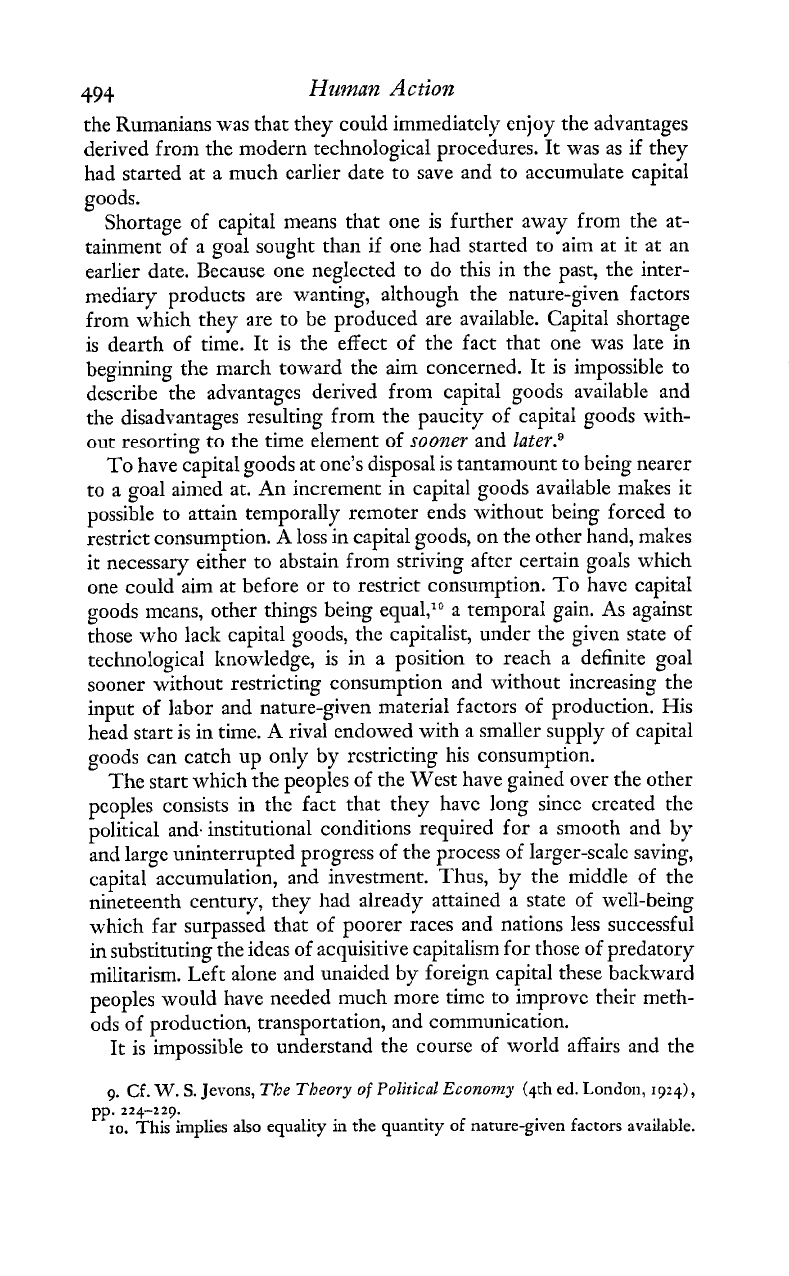
494
Human
Action
the Rumanians was that they could immediatel\; enjoy the advantages
derived from the modern technological procedures. It was as
if
they
had started at a much earlier date to save and to accumulate capital
goods.
Shortage of capital means that one is further away from the at-
tainment of a goal sought than if one had started to aim at it at an
earlier date. Because one neglected to do this in the past, the inter-
mediary products are wanting, although the nature-given factors
from which they are to be produced are availablc. Capital shortage
is dearth of time. It is the effect of the fact that one was late in
beginning the march toward the aim concerned. It is impossible to
dcscribe the advantages derived from capital goods available and
the disadvantages resulting from the paucity of capital goods with-
out resorting to the time element of
sooner
and
later.g
To have capital goods at one's disposal is tantamount to being nearer
to a goal aimed at. An increment in capital goods available makes it
possible to attain temporally remoter ends without being forced to
restrict consumption. A loss in capital goods, on the other hand, makes
it necessary either to abstain from striving after certain goals which
one could aim at before or to restrict consumption. To havc capita1
goods means, other things being equa1,'O a temporal gain. As against
those who lack capital goods, the capitalist, under the given state of
technological knowledge, is in a position to reach a definite goal
sooner without restricting consumption and without increasing the
input of labor and nature-given material factors of production. His
head start is in time.
A
rival endowed with a smaller supply of capital
goods can catch up only by restricting his consumption.
The start which the peoples of the West have gained over the other
peoples consists
in
the fact that they havc long since crcated the
political and. institutional conditions required for a smooth and
by
and large uninterrupted progress of the process
of
larger-scalc saving,
capital accumulation, and investment. Thus, by the middle of the
nineteenth century, they had aiready attained a state of w-eii-being
which far surpassed that of poorer races and nations less successful
in substituting the ideas of acquisitive capitalism for those of predatory
militarism. Left alone and unaided by foreign capital these backward
peoples would have needed much more timc to improvc their meth-
ods of production, transportation, and communication.
It is impossible to understand the course of world affairs and the
9.
Cf.
W.
S.
Jevons,
The
Theory
of
Political
Economy
(4th
ed. London,
1p4),
PP.
224-229.
10.
This
implies
also equality
in
the quantity
of
nature-given
factors
available.
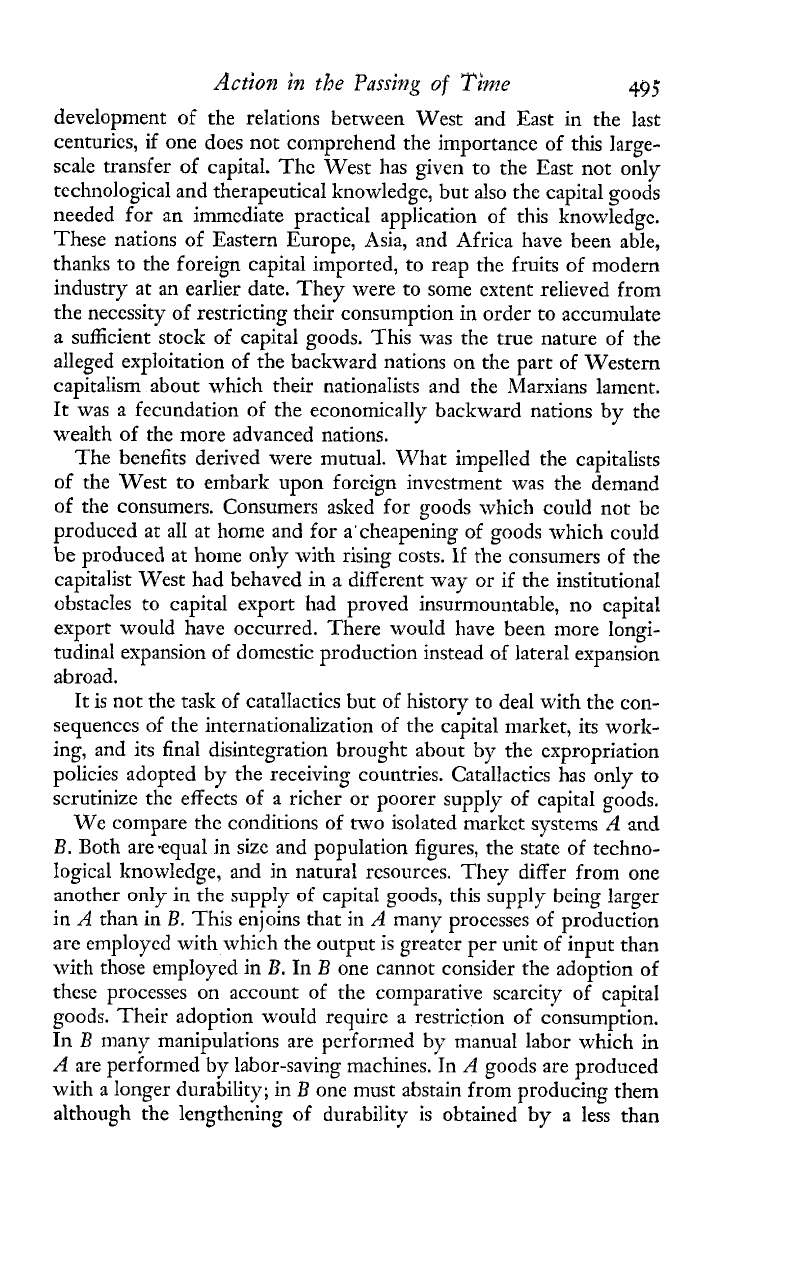
Action
ir2
the
Passing
of
Time
495
development of the relations benveen West and East in the last
centuries, if one does not comprehend the importance of this large-
scale transfer of capital. Tbc West has given to the East not only
technological and therapeutical knowledge, but also the capital goods
needed for an immediate practical application of this knowledge.
These nations of Eastern Europe, Asia, and Africa have been able,
thanks to the foreign capital imported, to reap the fruits of modern
industry at an earlier date. They were to some extent relieved from
the necessity of restricting their consumption in order to accumulate
a sufficient stock of capital goods. This was the true nature of the
alleged exploitation of the backward nations on the part of Western
capitalism about which their nationaIists and the Marxians lament.
It was
a
fecundation of the economically backward nations by the
wealth of the more advanced nations.
The benefits derived were mutual. What impelled the capitalists
of
the West to embark upon foreign investment was the demand
of the consumers. Consumers asked for goods which could not be
produced at a11 at home and for a'cheapening of goods
which
could
be produced at home only with rising costs.
If
the consumers of the
capitalist West had behaved in a different way or if the institutional
obstacles to capital export had proved insurmountable, no capital
export would have occurred. There would have been more longi-
tudinal expansion of domestic production instead of lateral expansion
abroad.
It is not the task of catallactics but of history to deal with the con-
sequences of the internationalization of the capital market, its work-
ing, and its final disintegration brought about by the expropriation
policies adopted by the receiving countries. Catallactics has only to
scrutinize the effects of a richer or poorer supply of capital goods.
We compare the conditions of two isolated market systems
A
and
B.
Both arevequal in size and population figures, the state of techno-
logical knowledge, and in natural resources. They differ from one
another only in the supply of capita1 goods, this supply being larger
in
A
than in
B.
This enjoins that in
A
many processes of production
are employed with which the output is greater per unit of input than
with those employed in
B.
In
B
one cannot consider the adoption of
these processes on account of the comparative scarcity of capital
goods. Their adoption wouId require a restriction of consumption.
In
B
many manipulations are performed by manual labor which in
A
are performed by labor-saving machines. In
A
goods are produced
with a longer durability; in
B
one must abstain from producing them
although the
lengthening
of durability is obtained by a less than
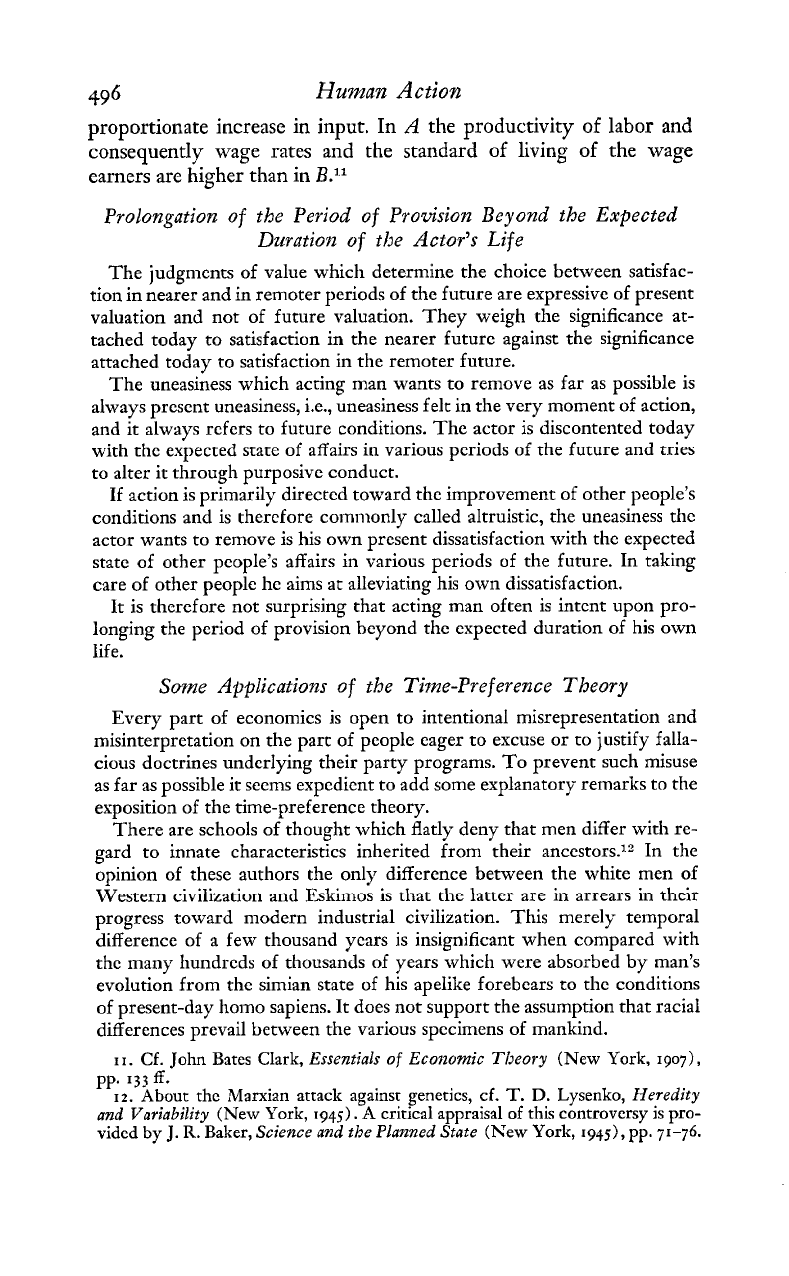
496
Human
Action
proportionate increase in input. In
A
the productivity
of
labor and
consequently
wage
rates and the standard
of
living of the wage
earners are higher than in
B.I1
Prolongation of the Period of Provision Beyond the Expected
Duration of tl~e Actor's
Life
The judgments of value which determine the choice between satisfac-
tion in nearer and in remoter periods of the future are expressive of present
valuation and not of future valuation. They weigh the significance at-
tached today to satisfaction in the nearer future against the significance
attached today to satisfaction in the remoter future.
The uneasiness which acting man wants to remove as far as possible is
always present uneasiness, i.e., uneasiness felt in the very moment of action,
and it always refers to future conditions. The actor is discontented today
with thc expected state of affairs in various periods of the future and tries
to alter it through purposive conduct.
If action is primarily directed toward the improvement of other people's
conditions and is thcrefore col-nmonly called altruistic, the uneasiness the
actor wants to remove is his own present dissatisfaction with thc expected
state of other people's affairs in various periods of the future. In taking
care of other people he aims at alleviating his own dissatisfaction.
It is thcrefore not surprising that acting man often is intent upon pro-
longing the period of provision beyond the expected duration of his own
life.
Some Applications of the Time-Preference Theory
Every part of economics is open to intentional misrepresentation and
misinterpretation on the part of people eager to excuse or to justify falla-
cious doctrines underlying their party programs. To prevent such misuse
as far
as
possible
it
seems expedient to add some explanatory remarks to the
exposition of the time-preference theory.
There are schools of thought which flatly deny that men differ with re-
gard to innate characteristics inherited from their anccst~rs.~Vn the
opinion of these authors the only difference between the white men of
TT,
vvestern
civiiizatior~
a11d
Eskimos
is
that the her are
in
arrears
in
their
progress toward modern industrial civilization. This merely temporal
difference of a few thousand years is insignificant when comparcd with
the many hundreds of thousands of years which were absorbed by man's
evolution from the simian state of his apelike forebears to the conditions
of present-day homo sapiens. It does not support the assumption that racial
differences prevail between the various specimens of mankind.
11.
Cf. John Bates Clark,
Essentials
of
Economic Tbeory
(New
York,
1907),
pp.
'33
ff.
12.
About
thc
Marxian
attack against genetics, cf.
T.
D.
Lysenko,
Heredity
and
Variability
(New York,
1945).
A
critical appraisal
of
this controversy is pro-
vided by
J.
R.
Baker,
Science and the Planned State
(hTew
York,
rg45),
pp.
71-76.
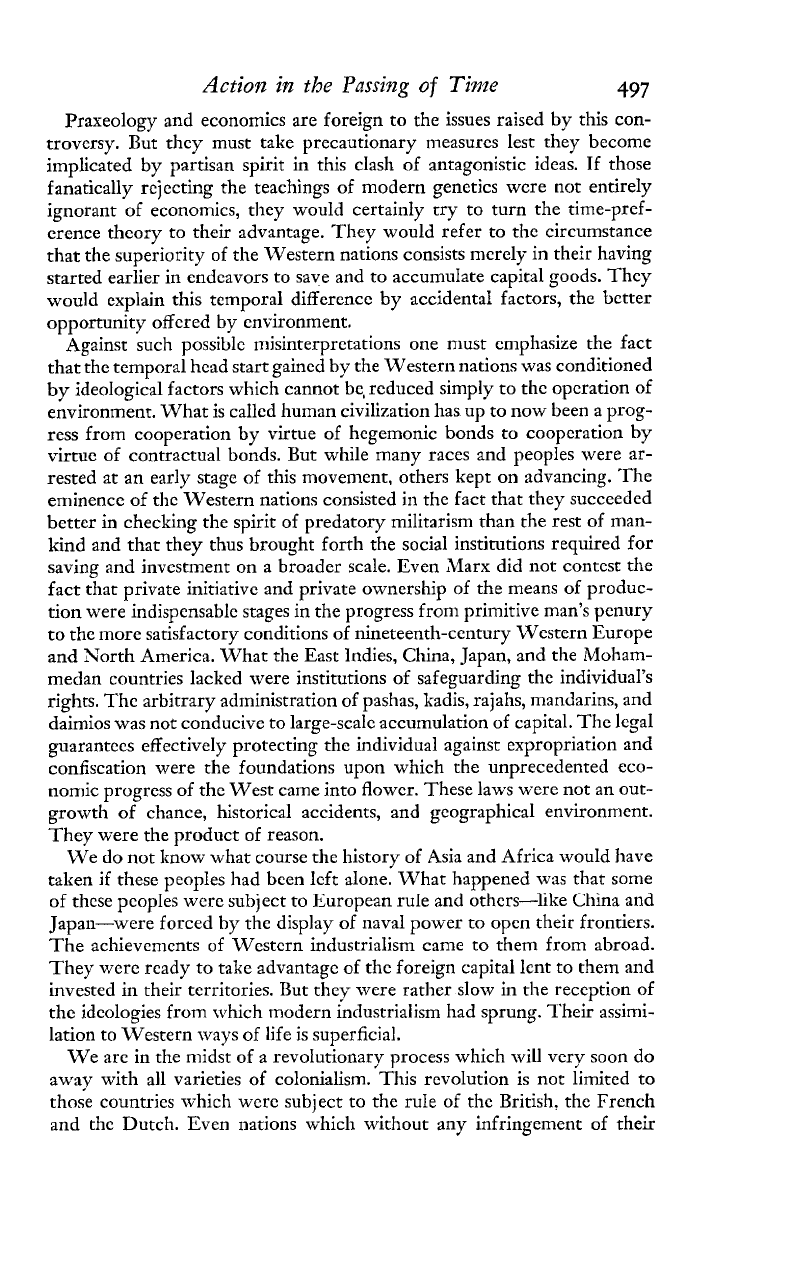
Action
in
the
Passing
of
Time
497
Praxeology and economics are foreign to the issues raised by this con-
troversy. But they must take precautionary measures lest they become
implicated by partisan spirit in this clash of antagonistic ideas. If those
fanatically rejecting the teachings of modern genetics were not entirely
ignorant of economics, they would certainly try to turn the time-pref-
ercnce theory to their advantage. They would refer to the circumstance
that the superiority of the Western nations consists merely in their having
started earlier in endeavors to save and to accumuIate capital goods. They
would explain this temporal difference by accidental factors, the better
opportunity offered by environment.
Against such possible misinterpretations one must emphasize the fact
that the temporal head start gained by the Western nations was conditioned
by ideological factors which cannot be, rcduced simply to the operation of
environment. What is called human civilization has up to now been a prog-
ress from cooperation by virtue of hegemonic bonds to cooperation by
virtue of contractual bonds. But while many races and peoples were ar-
rested at an early stage of this movement, others kept on advancing. The
eminence of the Western nations consisted in the fact that they succeeded
better in checking the spirit of predatory militarism than the rest of rnan-
kind and that they thus brought forth the social institutions required for
saving and investment on a broader scale. Even Marx did not contest the
fact that private initiative and private ownership of the means of produc-
tion were
indispensable
stages in the progress from primitive man's penury
to the more satisfactory conditions of nineteenth-century Western Europe
and North America. What the East lndies, China, Japan, and the Moham-
medan countries lacked were institutions of safeguarding the individual's
rights. The arbitrary administration of pashas, kadis, rajahs, mandarins, and
daimios was not conducive to large-scale accumulation of capital. The legal
guarantees effectively protecting the individual against expropriation and
confiscation were the foundations upon which the unprecedented eco-
nomic progress of the West came into flowcr. These laws were not an out-
growth of chance, historical accidents, and geographical environment.
They were the product of reason.
We do not know what course the history of Asia and Africa would have
taken if these peoples had been left alone. What happened was that some
of these peoples were subject to European rule and others-like China and
Japan-wcre forced by the display of naval power to open their frontiers.
The achievements of Western industrialism came to them from abroad.
They w-ere ready to take advantage of the foreign capital lent to them and
invested in their territories. But they were rather slow in the reception of
the ideologies from which modern industrialism had sprung. Their assimi-
lation to Western ways of life is superficial.
We are in the midst of a revolutionary process which will very soon do
away with all varieties of colonialism. This revolution is not limited to
those countries which were subject to the ruIe of thc British. thc French
and the Dutch. Even nations which without any infringement of their
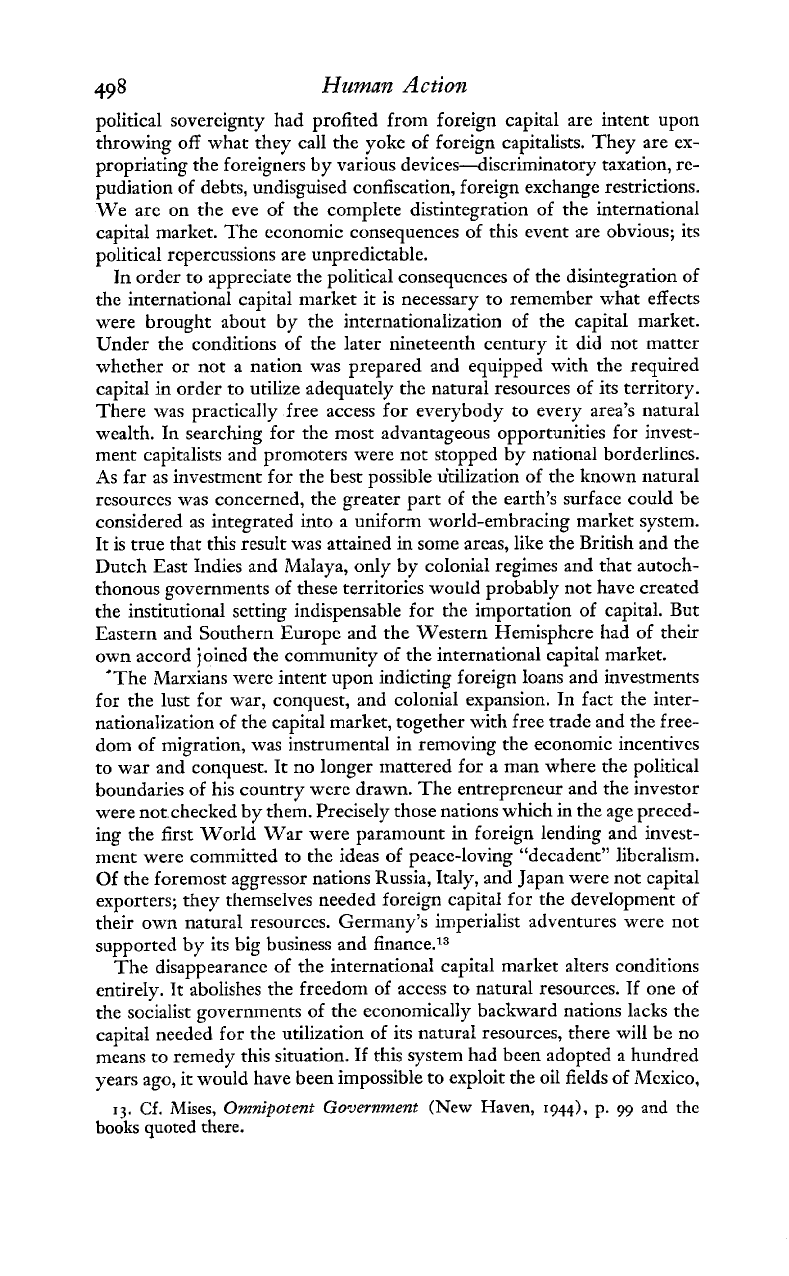
498
Human
Action
political sovereignty had profited from foreign capital are intent upon
throwing off what they call the yoke of foreign capitalists. They are ex-
propriating the foreigners by various devices-discriminatory taxation, rc-
pudiation of debts, undisguised confiscation, foreign exchange restrictions.
We are on the eve of the complete distintegration of the international
capital market. The economic consequences of this event are obvious; its
political repercussions are unpredictable.
In order to appreciate the political consequences of the disintegration of
the international capital market it is necessary to remember what effects
were brought about by the internationalization of the capital market.
Under the conditions of the later nineteenth century it did not matter
whether or not a nation was prepared and equipped with the required
capital in order to utilize adequately the natural resources of its territory.
There was practically free access for everybody to every area's natural
wealth. In searching for the most advantageous opportunities for invest-
ment capitalists and promoters were not stopped by national borderlines.
As far as investment for the best possible u'tilization of the known natural
resources was concerned, the greater part of the earth's surface could be
considered as integrated into a uniform world-embracing market system.
It is true that this resuIt was attained
in
some areas, like the British and the
Dutch East Indies and Malaya, only by colonial regimes and that autoch-
thonous governments of these territories would probably not have created
the institutional setting indispensable for the importation of capital. But
Eastern and Southern Europe and the Western Hemisphere had of their
own accord joined the community of the international capita1 market.
'The Marxians were intent upon indicting foreign loans and investments
for the lust for war, conquest, and colonial expansion. In fact the inter-
nationalization of the capital market, together with free trade and the free-
dom of migration, was instrumental in removing the economic incentives
to war and conquest. It no longer mattered for a man where the political
boundaries of his country were drawn. The entrepreneur and the investor
were not checked by them. Precisely those nations which in the age preced-
ing the first World War were paramount in foreign lending and invest-
ment were committed to the ideas of peace-loving "decadent" liberalism.
Of
the foremost aggressor nations Russia, Italy, and Japan were not capital
exporters; they themseives needed foreign capitai for the deveiopment of
their own natural resourccs. Germany's imperialist adventures were not
supported by its big business and finance.13
The disappearance of the international capital market alters conditions
entireIy. It abolishes the freedom of access to natural resourccs. If one of
the socialist governments of the economically backward nations lacks the
capital needed for the utilization of its natural resources, there will be no
means to remedy this situation. If this system had been adopted a hundred
years ago, it would have been impossible to exploit the oil fields of Mexico,
13.
Cf.
~Mises,
Omnipotent Government
(New Haven,
1944)-
p.
99
and
thc
books quoted there.
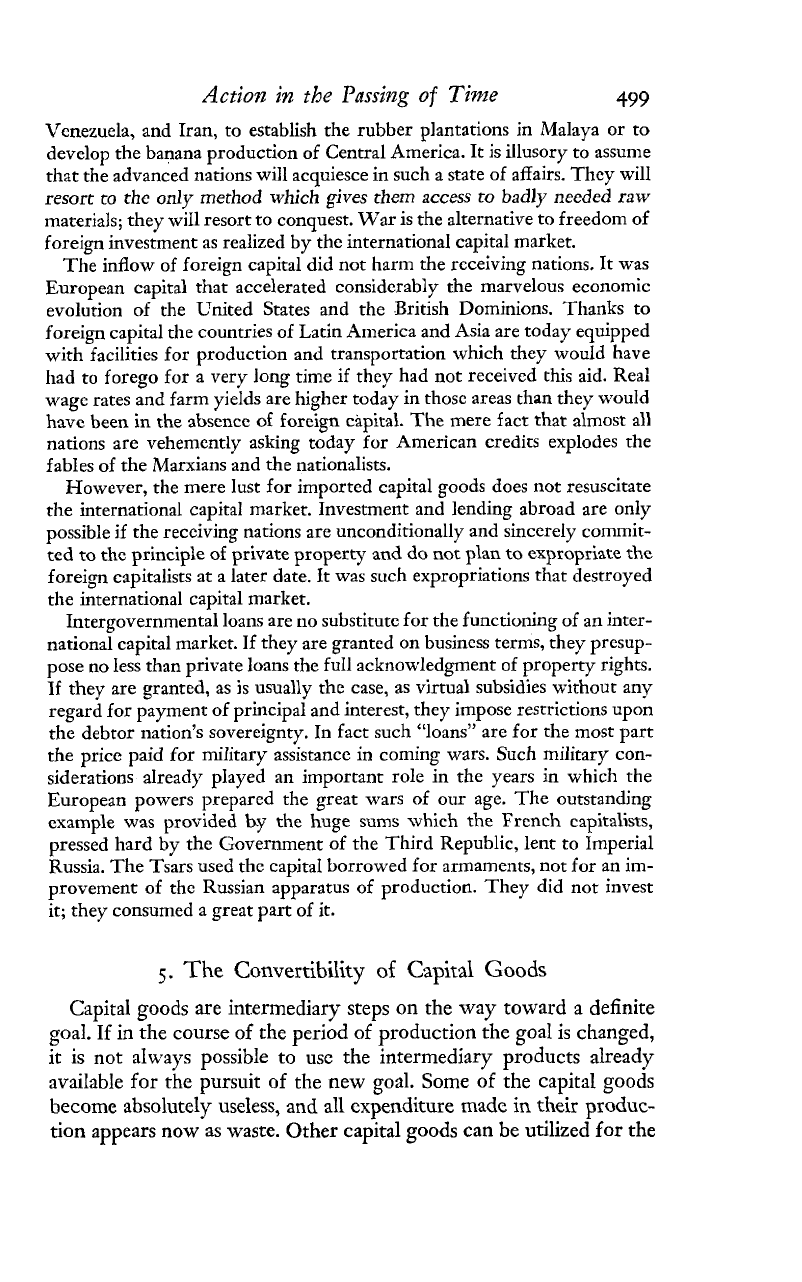
Action in the Passing
of
Time
Venezuela, and Iran, to establish the rubber plantations in Malaya or to
develop the banana production
of
Central America. It is illusoxy to assume
that the advanced nations will acquiesce in such a state of affairs. They will
resort to the only method which
gives
them access to badly needed
raw
materials; they wiIl resort to conquest. War is the alternative to freedom of
foreign investment as realized by the international capital market.
The inflow of foreign capital did not harm the receiving nations. It was
European capital that accelerated considerably the marvelous economic
evolution of the United States and the British Dominions. Thanks to
foreign capital the countries of Latin America and Asia are today equipped
with facilities for production and transportation which they would have
had to forego for a very long time if they had not received this aid. Real
wage rates and farm yields are higher today in those areas than they would
have been
in
the absence of foreign capital. The mere fact that almost all
nations are vehemcntly asking today for American credits explodes the
fables of the Marxians and the nationalists.
However, the mere lust for imported capital goods does not resuscitate
the international capital market. Investment and lending abroad are only
possible if the recciving nations are unconditionally and sincerely commit-
ted to the principle of private property and do not plan to expropriate the
foreign capitalists at a later date. It was such expropriations that destroyed
the international capital market.
Intergovernmental loans are no substitute for the functioning of an inter-
national capital market. If they are granted on business terms, they prcsup-
pose no less than private loans the fuIl acknowledgment of property rights.
If
they are granted, as is usually the case, as virtual subsidies without any
regard for payment of principal and interest, they impose restrictions upon
the debtor nation's sovereignty. In fact such "loans" are for the most part
the price paid for military assistance in coming wars. Such military con-
siderations already played an important role in the years in which the
European powers prepared the great wars of our age. The outstanding
example was provided by the huge
sums
which the French capitalists,
pressed hard by the Government of the Third Republic, lent to Imperial
Russia. The Tsars used the capita1 borrowed for armaments, not for an im-
provement of the Russian apparatus of production. They did not invest
it; they consumed a great part of it.
5.
The
Convertibility
of
Capital
Goods
Capital goods are intermediary steps on the way toward a definite
goal. If in the course of the period of production the goal is changed,
it is not always possible to
use
the intermediary products already
available for the pursuit of the new goal. Some of the capital goods
become absolutely useless, and all
expenditure
made
in
their
produc-
tion appears now as waste. Other capital goods can be utilized for the
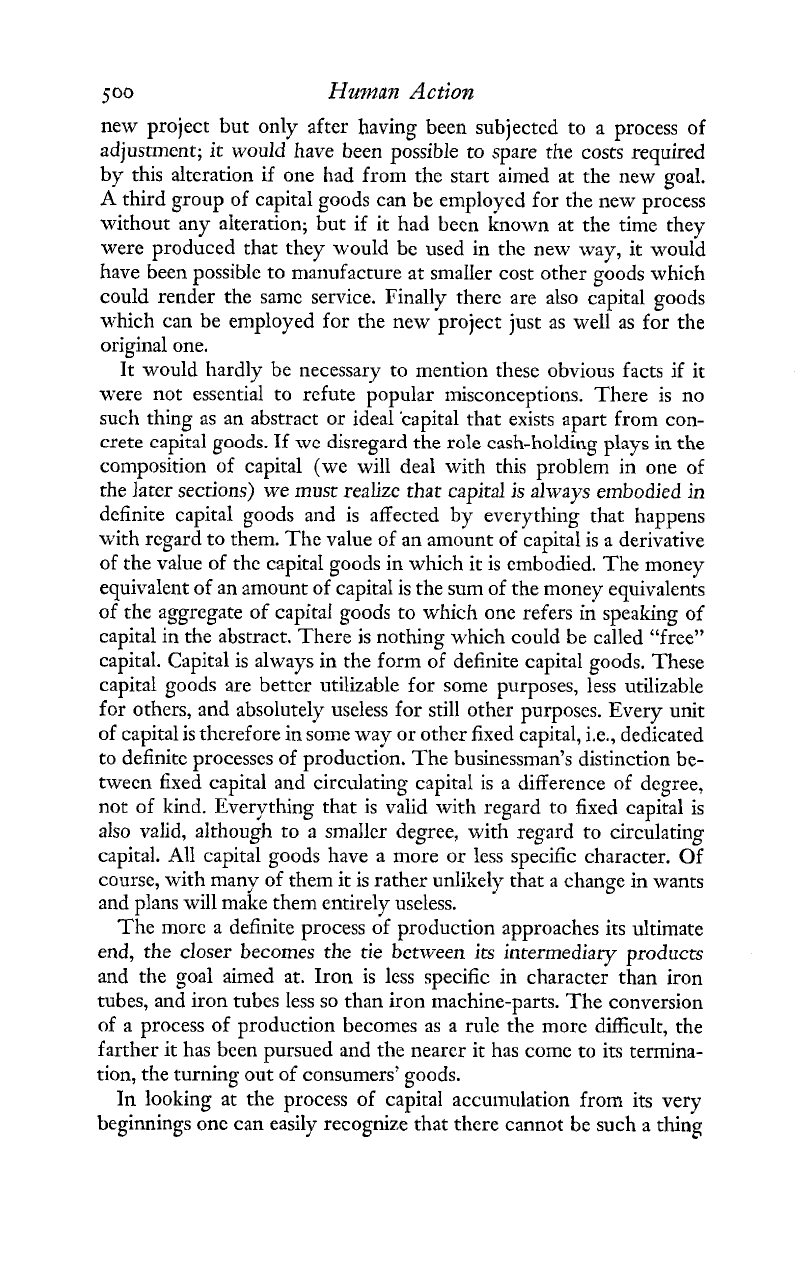
500
Human
Action
new project but only after having been subjected to a process of
adjustment; it would have been possible to spare the costs required
by this alteration if one had from the start aimed at the new goal.
A
third group of capital goods can be employed for the new process
without any alteration; but if it had been known at the time they
were produced that they would be used in the new way, it would
have been possible to manufacture at smaller cost other goods which
could render the same service. Finally there are also capital goods
which can be employed for the new project just as well as for the
original one.
It would hardly be necessary to mention these obvious facts if it
were not essential to refute popular misconceptions. There is no
such thing as an abstract or ideal 'capital that exists apart from con-
crete capital goods. If we disregard the role cash-holding plays in the
composition of capital
(we
will deal with this problem in one of
the later sections) we
must
realize that capital
is
always embodied
in
definite capital goods and is affected by everything that happens
with regard to them. The value of an amount of capital is a derivative
of the value of the capita1 goods in which it is embodied. The money
equivalent of an amount of capital is the sum of the money equivalents
of the aggregate of capital goods to which one refers in speaking of
capital in the abstract. There is nothing which could be called "free"
capital. Capital is always in the form of definite capital goods. These
capital goods are better utilizable for some purposes, less utilizable
for others, and absolutely useless for still other purposes. Every unit
of capital is therefore in some way or other fixed capital, i.e., dedicated
to definite processes of production. The businessman's distinction be-
tween fixed capital and circulating capital is a difference of degree,
not of kind. Everything that is valid with regard to fixed capital is
also valid, although to
a
smaller degree, with regard to circulating
capital.
All
capital goods have a more or less specific character. Of
course, with many of them it is rather unlikely that a change in wants
and plans will make them entirely useless.
The more a definite process of production approaches its ultimate
end, the closer becomes the tie between its intermediary products
and the goal aimed at. Iron is less specific in character than iron
tubes, and iron tubes less so than iron machine-parts. The conversion
of a process of production becomes as a rule the more difficult, the
farther it has been pursued and the nearer it has come
to
its terrnjna-
tion, the turning out of consumers' goods.
In looking at the process of capital accumulation from its very
beginnings one can easily recognize that there cannot be such a thing
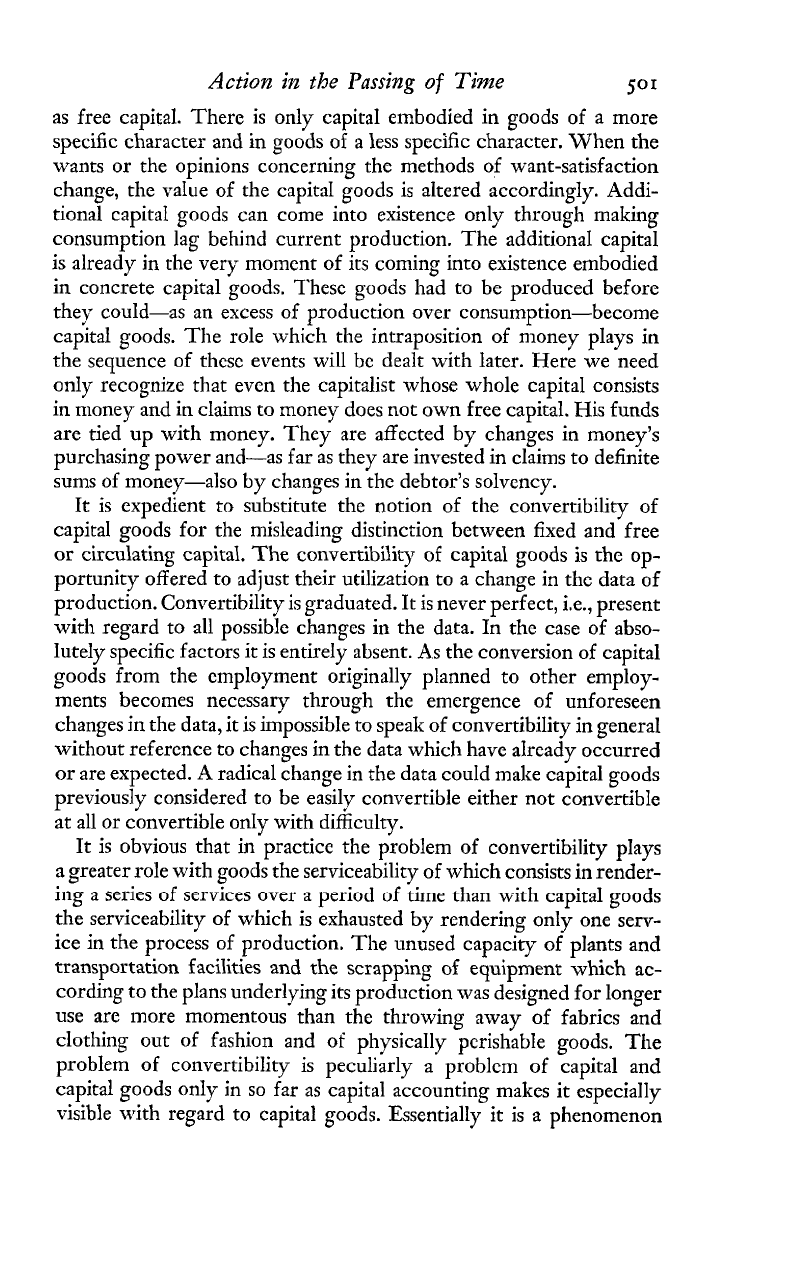
Action in
the
Passing of
Time
501
as free capital. There is only capital embodied in goods of a more
specific character and in goods of a less specific character. When the
wants or the opinions concerning the methods of want-satisfaction
change, the vaIue of the capita1 goods is altered accordingly. Addi-
tional capita1 goods can come into existence only through making
consumption lag behind current production. The additionaI capital
is already in the very moment of its coming into existence embodied
in concrete capital goods. These goods had to be produced before
they could-as an excess of production over consumption-become
capital goods. The role which the intraposition of money plays in
the sequence of these events will be dealt with Iater. Here we need
only recognize that even the capitalist whose whole capital consists
in money and in claims to money does not own free capital.
His
funds
are tied up with money. They are affected by changes in money's
purchasing power and-as far as they are invested in claims to definite
sums of money-also by changes in the debtor's solvency.
It is expedient to substitute the notion of the convertibility of
capital goods for the misleading distinction between fixed and free
or circulating capital. The convertibility of capital goods is the op-
portunity offered to adjust their utilization to a change in the data of
production. Convertibility is graduated. It is never perfect, i.e., present
with regard to all possible changes in the data. In the case of abso-
lutely specific factors it is entirely absent. As the conversion of capital
goods from the employment originally planned to other employ-
ments becomes necessary through the emergence of unforeseen
changes in the data, it is impossible to speak of convertibility in general
without reference to changes in the data which have already occurred
or are expected. A radical change in the data could make capital goods
previously considered to be easily convertible either not convertible
at all or convertible only with difficulty.
It is obvious that in practice the problem of convertibility plays
a greater role with goods the serviceability of which consists in render-
ing a series of services over
a
period of time than with capital goods
the serviceability of which is exhausted by rendering only one serv-
ice in the process of production. The unused capacity of plants and
transportation facilities and the scrapping of equipment which ac-
cording to the plans underlying its production was designed for longer
use are more momentous than the throwing away of fabrics and
clothing out of fashion and of physically perishabIe goods.
The
problem of convertibility is peculiarly a problem of capital and
capital goods only in so far as capital accounting makes it especially
visible with regard to capital goods. Essentially it is
a
phenomenon
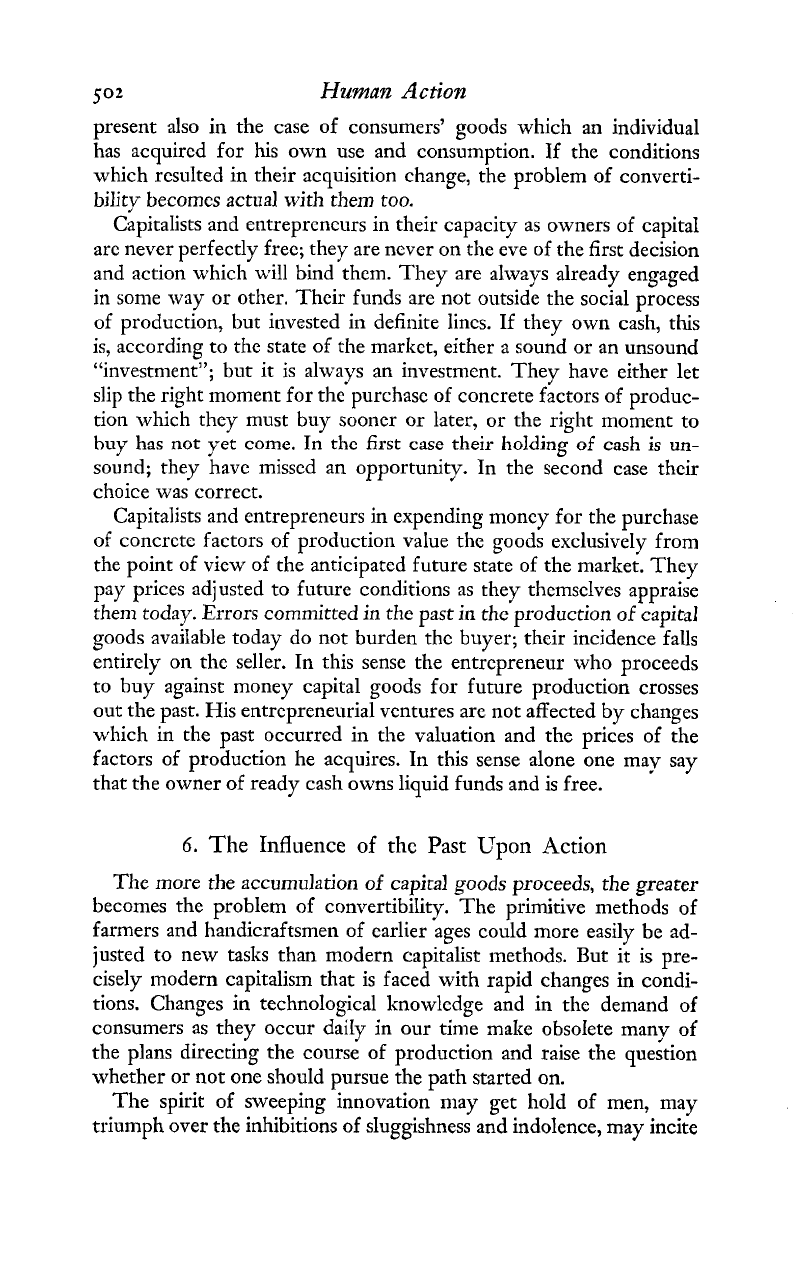
502
Human
Action
present also in the case of consumers' goods which an individual
has acquircd for his own use and consumption.
If
the conditions
which resulted in their acquisition change, the problem of converti-
bility becomes actual with them too.
Capitalists and entrepreneurs in their capacity as owners of capital
arc never perfectly frec; they are ncvcr on the eve of the first decision
and action which will bind them. They are always already engaged
in some way or other. Their funds are not outside the social process
of production, but invested in definite lines. If they own cash, this
is, according to the state of the market, either a sound or an unsound
"investment"; but it is always an investment. They have either let
slip the right moment for the'purchase of concrete factors of produc-
tion which they must buy sooner or later, or the right moment to
buy has not yet come. In the first case their holding of cash is un-
sound; they have missed an opportunity. In the second case their
choice
was
correct.
Capitalists and entrepreneurs in expending moncy for the purchase
of concretc factors of production value the goods exclusively from
the point of view of the anticipated future state of the market. They
pay prices adjusted to future conditions as they thcmsclves appraise
them today. Errors committed
in
the past
in
thc production of capital
goods available today do not burden the buyer; their incidence falls
entirely on the seller. In this sense the entrepreneur who proceeds
to buy against money capital goods for future production crosses
out the past. His entrcprcneurial vcntures are not affected by changes
which in the past occurred in the valuation and the prices of the
factors of production he acquires. In this sense alone one may say
that the owner of ready cash owns liquid funds and is free.
6.
The
Influence of the Past Upon Action
The more the accumulation of capital goods proceeds, the greater
becomes the problem of convertibility. The primitive methods of
farmers and handicraftsmen of earlier ages could more easily
be
ad-
justed to new tasks than modern capitalist methods. But it is pre-
cisely modern capitalism that is faced with rapid changes in condi-
tions. Changes in technological knowledge and in the demand of
consumers as they occur daiIy in our time make obsoIete many of
the plans directing the course of production and raise the question
whether or not one should pursue the path started on.
The spirit of sweeping innovation may get hold of men, may
triumph over the inhibitions of sluggishness and indoIence, may incite
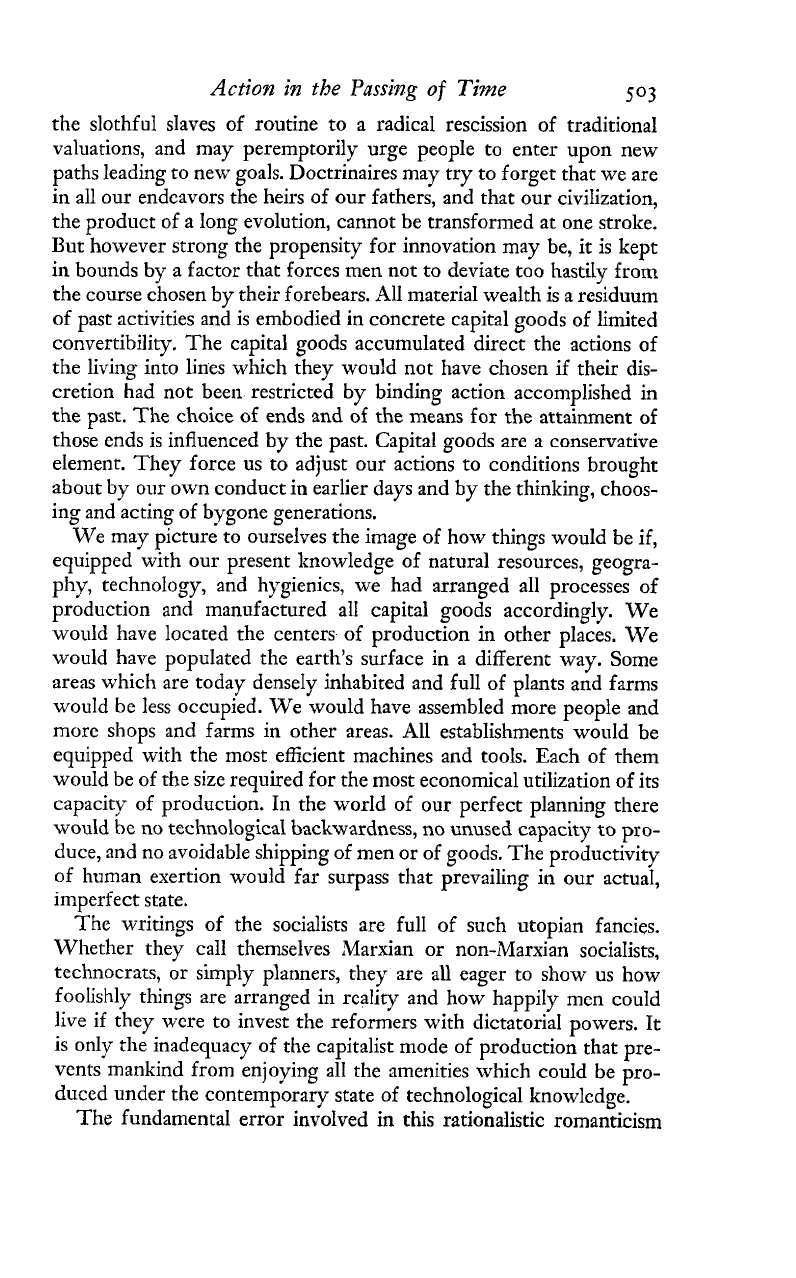
Action in the
Passing
of
Time
503
the slothful slaves of routine to a radical rescission of traditional
valuations, and may peremptorily urge people to enter upon new
paths leading to new goals. Doctrinaires may try to forget that we are
in all our endeavors the heirs of our fathers, and that our civilization,
the product of a long evolution, cannot be transformed at one stroke.
But however strong the propensity for innovation may be, it is kept
in
bounds by a factor that forces men not to deviate too hastily from
the course chosen by their forebears. All material wealth is a residuum
of past activities and is embodied in concrete capital goods of limited
convertibility. The capital goods accumulated direct the actions of
the living into lines which they would not have chosen if their dis-
cretion had not been restricted by binding action accomplished in
the
past. The choice of ends and of the means for the attainment of
those ends is influenced by the past. Capital goods are a conservative
element. They force us to adjust our actions to conditions brought
about by our own conduct in earlier days and by the thinking, choos-
ing and acting of bygone generations.
We may picture to ourselves the image of how things would be if,
equipped with our present knowledge of natural resources, geogra-
phy, technology, and hygienics, we had arranged all processes of
production and manufactured all capital goods accordingly. We
would have located the centers of production in other places. We
would have populated the earth's surface in a different way. Some
areas which are today denseIy inhabited and full of plants and farms
would be less occupied. We would have assembled more people and
morc shops and farms in other areas. All establishments would be
equipped with the most efficient machines and tools. Each of them
would be of the size required for the most economical utilization of its
capacity of production. In the world of our perfect planning there
would
be
no technological backwardness, no unused capacity to pro-
duce, and no avoidable shipping of men or of goods. The productivity
of human exertion would far surpass that prevailing in our actual,
imperfect state.
The
writings of the socialists are full of such utopian fancies.
Whether they call themselves Marxian or non-Marxian socialists,
technocrats, or simply planners, they are all eager to show us how
foolishly things are arranged in rcality and how happily men could
live if they were to invest the reformers with dictatorial powers. It
is only the inadequacy of the capitalist mode of production that pre-
vents mankind from enjoying all the amenities which could be pro-
duced under the contemporary state of technological knowledge.
The fundamental error involved in this rationalistic romanticism
